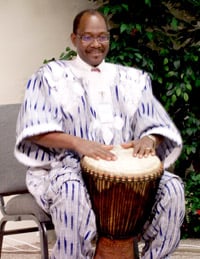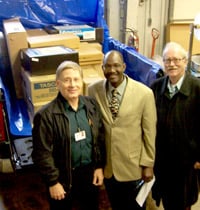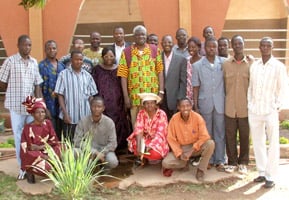MENU
(Nov. 18, 2011 - by Marla Bender and Harold Goerzen) Growing up in the landlocked West African country of Burkina Faso, a young Étienne Kiemdé seemed like an unlikely candidate to be involved in Christian radio outreach.
He was born into an animistic family, but because Islam was the country's majority religion, his parents thought it best to teach him to be a good Muslim. He prayed five times a day, attended the local mosque, memorized verses from the Quran and was well on his way to fulfilling his parents' goal.
But all that changed in high school when a classmate told him about Jesus, and he heard the gospel for the first time. "I gave my life to the Lord," he recounted to staff members during a recent visit to the HCJB Global Technology Center in Elkhart, Ind. "I asked God to use me in any way He wanted."
Kiemdé went on to receive training in Bible, evangelism and radio engineering in three different European schools. Because France had given him a permanent visa, he could have stayed and worked in the relative safety and comfort of a modern French city. But he chose to return to the poverty and hardships of his remote homeland in order to minister to his countrymen.
Today Kiemdé oversees a network of Christian radio stations in eight locations throughout Burkina Faso in the Radio Evangile Développement (RED) network that was established with radio equipment and technical assistance from the Technology Center in 1993.
"We could not do this without the help of HCJB Global," Kiemdé said. "The Lord put us hand-in-hand to do the work for Him. We are having a tremendous impact on the population. Burkina Faso is an oral society, and we are always learning by listening."
On Wednesday, Oct. 19, Kiemdé, together with Franklin Spotts, executive director of Francophone Ministries, were at the Technology Center to pick up an antenna, transmitter and studio equipment-nearly everything they'd need to set up a ninth RED station in Kaya, the eighth-largest city of Burkina Faso.
Engineer Curt Bender reported on Tuesday that thieves had broken into the shipping container with the equipment bound for Burkina Faso. "A CD player and two mixing consoles were stolen, but we are in the process of obtaining new ones to replace what was stolen," he said.
The eight RED stations broadcast the gospel in 25 languages to a potential audience of 2.5 million. That total will increase by about 220,000 when the station goes on the air in Kaya, a city about 70 miles northeast of the capital, Ouagadougou.
The station will be started on request of the local Christian community in Kaya, the capital of Sanmatenga province where there is little coverage on national radio. There are two private radio stations in the city, one Catholic, the other commercial.
"As you can see, there's room for an evangelical radio station in Kaya that can cover the entire population and air programs addressing not only the spiritual needs but also education, health, development and human rights issues, especially concerning women and children," Kiemdé said.
Agriculture and raising livestock are the main economic activities of the area along with handicrafts (leather goods, pottery and bronze) and other small businesses. The three primary religions in the province are Islam (40 percent), animism (34 percent) and Christianity (25 percent).
The stations in the network have found favor with the government because the Christian programming and community health information is "transforming mankind-body, soul and spirit," Kiemdé explained. The station in Kaya will air programs in five languages: Mooré, Fulfuldé, Hausa, Yoruba and French.
Sources: HCJB Global, RED
He was born into an animistic family, but because Islam was the country's majority religion, his parents thought it best to teach him to be a good Muslim. He prayed five times a day, attended the local mosque, memorized verses from the Quran and was well on his way to fulfilling his parents' goal.
 |
| Étienne Kiemdé |
Kiemdé went on to receive training in Bible, evangelism and radio engineering in three different European schools. Because France had given him a permanent visa, he could have stayed and worked in the relative safety and comfort of a modern French city. But he chose to return to the poverty and hardships of his remote homeland in order to minister to his countrymen.
Today Kiemdé oversees a network of Christian radio stations in eight locations throughout Burkina Faso in the Radio Evangile Développement (RED) network that was established with radio equipment and technical assistance from the Technology Center in 1993.
"We could not do this without the help of HCJB Global," Kiemdé said. "The Lord put us hand-in-hand to do the work for Him. We are having a tremendous impact on the population. Burkina Faso is an oral society, and we are always learning by listening."
 |
| L-R: Curt Bender, Étienne Kiemdé and Franklin Spotts with equipment destined for Burkina Faso. |
Engineer Curt Bender reported on Tuesday that thieves had broken into the shipping container with the equipment bound for Burkina Faso. "A CD player and two mixing consoles were stolen, but we are in the process of obtaining new ones to replace what was stolen," he said.
The eight RED stations broadcast the gospel in 25 languages to a potential audience of 2.5 million. That total will increase by about 220,000 when the station goes on the air in Kaya, a city about 70 miles northeast of the capital, Ouagadougou.
The station will be started on request of the local Christian community in Kaya, the capital of Sanmatenga province where there is little coverage on national radio. There are two private radio stations in the city, one Catholic, the other commercial.
 |
| Radio Evangile Développement team in Burkina Faso. |
Agriculture and raising livestock are the main economic activities of the area along with handicrafts (leather goods, pottery and bronze) and other small businesses. The three primary religions in the province are Islam (40 percent), animism (34 percent) and Christianity (25 percent).
The stations in the network have found favor with the government because the Christian programming and community health information is "transforming mankind-body, soul and spirit," Kiemdé explained. The station in Kaya will air programs in five languages: Mooré, Fulfuldé, Hausa, Yoruba and French.
Sources: HCJB Global, RED
